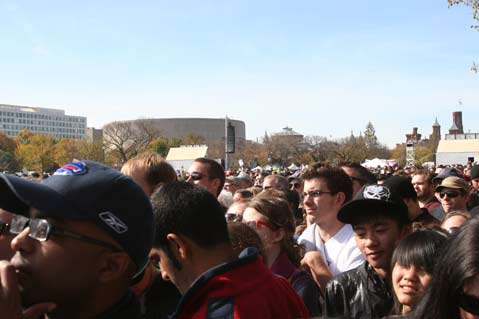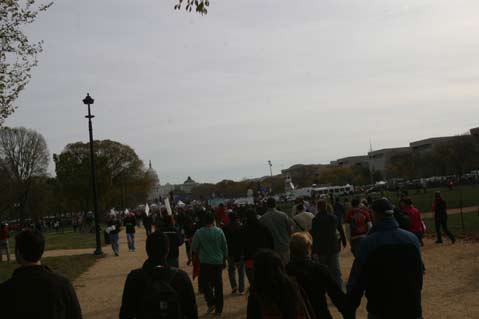Hooray for Our Side
The Irony Is the Message

“What exactly was this?” asked Jon Stewart of the over 200,000 people on the most American of lawns at the National Mall in Washington DC, at the Rally to Restore Sanity on Saturday, October 30. The onstage antics had been generally aimed at calling out television news giants for sensationalist and fear-based framing of the news. But when the celebrity appearances, musical performances, and farcical parodying of punditry that is the trademark of Stewart and Colbert’s shows were all said and done, attendees and presenters alike seemed uncertain as to what, if anything, had been accomplished.
After all, how exactly do you carry out an ironic rally? “Give me ambivalence, or give me something else,” had been among the credos drawn in black Sharpie on brown cardboard and carried into downtown DC hours earlier–which outlined well the fact that there has perhaps never been a less defined, less directed campaign commanding the attention of the country.
But this is perhaps to be expected from a generation that persists in defining itself more through irony than conviction. This stance, viewed as wisdom by the Millennial Generation or ‘iGen,’ could just as easily be called cowardice, indifference, or laziness. Not “I am who I am” for us. Members of the iGen are, first and foremost, not who they don’t want to be.
So Jon Stewart—parodic iconoclast and catalyst for much of the political or rather anti-political ardor of the iGen—knew how to fill the capitol, but was then faced with the dilemma of providing something of specific value to a crowd motivated by sarcasm.

“Sanity” is, after all, a fairly subjective term in politics. No doubt the tea party enthusiasts, so recently marching on the mall themselves (and who took their first stand in Santa Barbara in 2009) were brought out by the same ideal: the restoration of sanity as they see it. Compounding the problem of undefined direction on the organizers’ part, there was little agreement among attendees as to what purpose the rally would serve, though many clearly did hope for a partisan message: a stand against tea party libertarianism and a statement of confidence in the Obama administration.
The clash of comedy and sincerity was literally written on the signs carried into the mall, with slogans like “Put your Tea on Ice” and “Thanks for the Healthcare” taking strong political stances alongside others remaining staunchly message-less, such as “I like Signs.”
Mrs. Wheeler, a Baby Boomer from Missouri whose kids sent her as a Christmas present, was excited as the rally began, asking: “Is it 1968 again?” She came expecting an assertion of liberal patriotism. “This is an independent thinking rally, for realAmericans,” said Wheeler. “America to me is freedom of religion, freedom of speech.” Wheeler believed the rally was a chance for liberals to prove their ardor was no less than that of the GOP, and to proudly show their colors to the country.
Dick Church from Ohio had come expecting to hear a denouncement of the party system altogether. Washington DC student Raphael Perrino, too, came to support nonpartisanship, saying, “The educated population is not ready to buy rhetoric on either side.”
Wendy Smith from Toronto and Dennis from Kansas City both came to protest particularly right-wing fear-mongering. Church likened Fox News’s programming to witch-hunting, saying, “We’re headed towards McCarthyism.”
In conflict with these expectations, the next two hours were resolutely apolitical and far more focused on comedy than on sincerity; and late in the event, as Sheryl Crow came to sing onstage, the restlessness of the crowd was palpable. Soon, a commonly articulated fear was that Stewart was unable to think of something constructive to do with everyone now that he had brought them there. “I was worried,” said Perrino, remembering the rally’s 11th hour, “that the tone would never transcend the witty back-and-forth between Colbert and Stewart.”
For this reason, an oppressive silence fell, weighted by collective expectation, as Stewart took the stage after all other performers had retired. “I’m really glad you’re here,” he said, “even though none of us are quite sure why we are here.” He then explained his reasons for avoiding a political agenda, and for targeting the news media for admonishment.
“Twenty-four hour news didn’t cause our problems,” he said. “But its existence makes solving them that much harder. The press can hold its magnifying glass to our problems to give them focus, or to find something we’ve missed—or to set ants on fire.”
Stewart was careful to point out that he was not saying “that it’s not hard and we have nothing to fear. It is, and we do.” He defined his stance, though, as one of practicality, even optimism. “We live in hard times,” he quipped, “not end times.” Regardless of the considerable disagreement in our political discourse, said Stewart, “If we amplify everything, we hear nothing.” And it was largely TV, that constant conversation in our living rooms, which Stewart wanted to hold accountable for exaggeration and for gratuitous bitterness among America’s parties and people.
But if TV was the villain of the day, another medium was held up as something of a hero. Perrino, the DC student, said of the Internet, which had brought a lot of people to the rally and was also touted by many rally-goers as the news source they use to form their positions, “We’re going from digital to physical.” Perrino came to meet in person, for the first time, friends he had made on the popular link-sharing online community Reddit. Likewise, Wendy Smith from Toronto came to see friends from Etsy (an online marketplace for homemade crafts) whom she had known for years but never met; and this was common among attendees. Viewed from this perspective, the rally started to look like a rejection of one-way news media in favor of the online conversation. As one woman from New York remarked, while denouncing Fox News, “We have our own news media; it’s called Facebook.”
Stewart defined the purpose of the ironic rally as a bipartisan attack on the American news media, even citing left-swayed MSNBC as a culprit alongside notoriously right-wing Fox News. While this apolitical stance brought some disappointment to the primarily left-leaning crowd, it also gave his message power and credibility.
So in the final analysis, Stewart succeeded in identifying a problem that is generally off the radar of political punditry. Clearly, he wanted to leverage the value of his position of satirist: His detachment from either side of an argument makes possible some of his more incisive observations. (“I know there are rules for a comedian pundit,” he admitted, “and I’m sure I’ll find out tomorrow how I have violated them.”) In a way, the rally was a kind of proof that irony as a political language does have value, and is capable of bringing new ideas into the conversation—because those in media with agendas, on either side, are unable to see problems outside their argument.
The antidote to panic, according to Stewart, is to give ourselves credit for what we accomplish despite our disagreement. “We hear every day how fragile our country is and how we can’t work together to get things done—but we do. Impossible things, every day, are made possible by the reasonable compromises we make.”
So instead of the hoped-for-by-some partisan message (satirically expressed by one sign reading “Hooray For Our Side,” recalling the ironic statement in Buffalo Springfield’s 1966 great protest anthem “For What It’s Worth”), Stewart put his professional-outsider comedian status to work spreading the enlightening gift of perspective. That the volume of our argument is as much the problem as the argument itself seems to be one of the messages this generation has learned. This was the ultimate message made by 200,000 self-proclaimed disciples of reasonability last Saturday: Sanity means, “Let’s take a breath and then continue to argue.”
“Sanity, after all, is in the eye of the beholder,” reminded Stewart, before he ended the day with hope. “To see you here today and the kind of people that you are has restored mine.”



